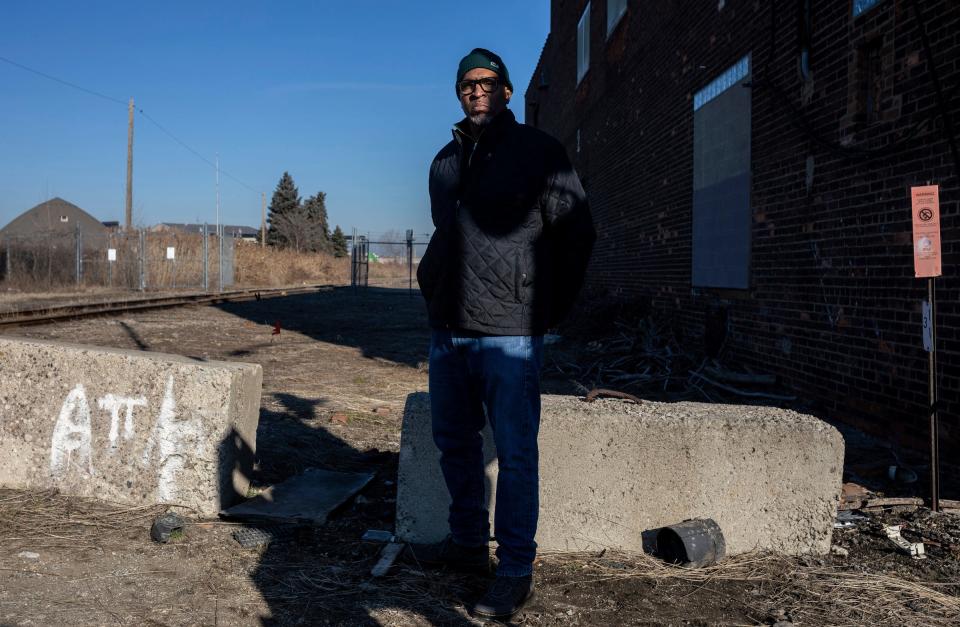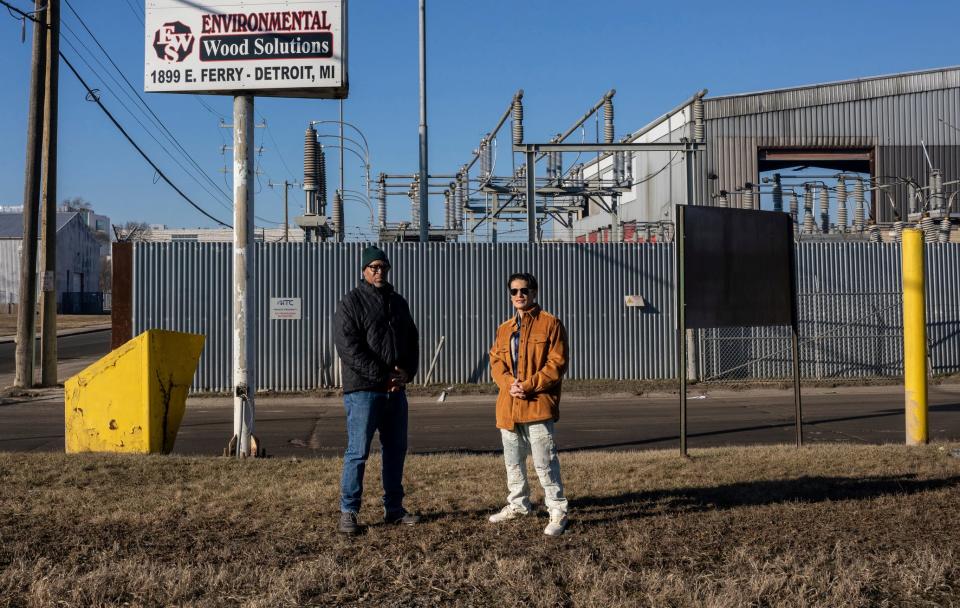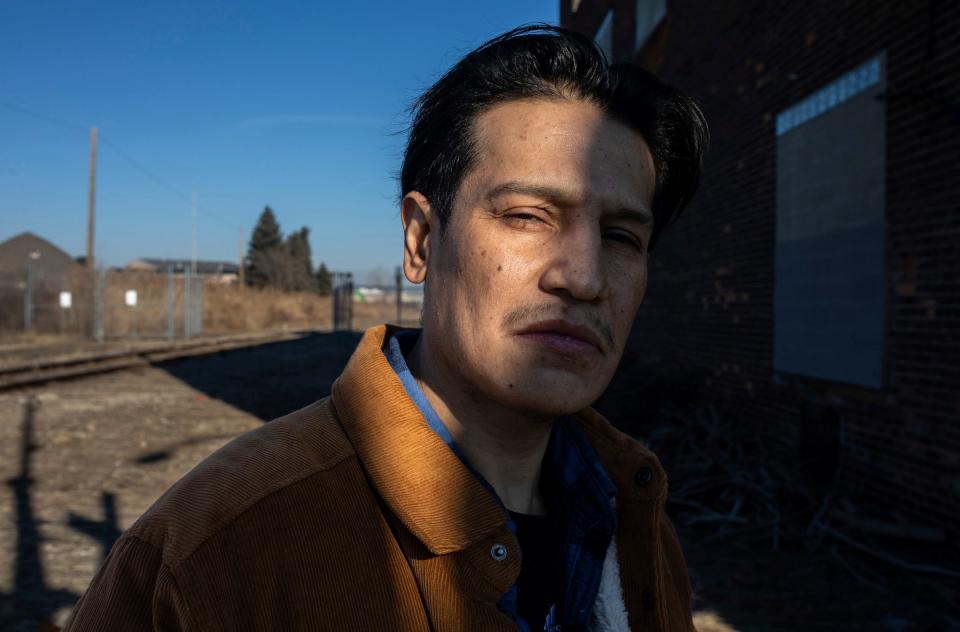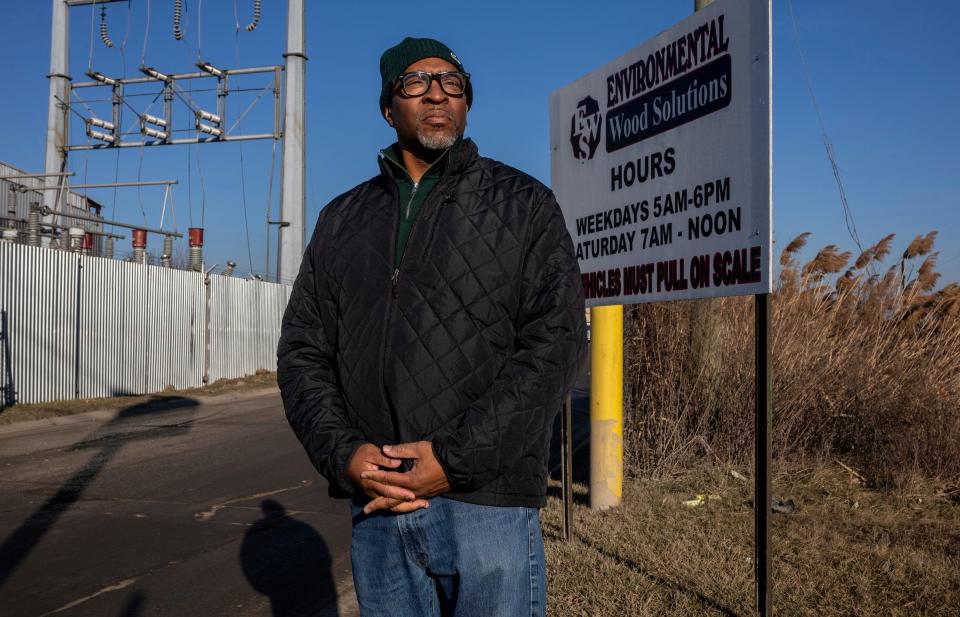Lawsuit: Lake Orion trucking company had whites-only restroom, N-word on work microwave
Darryl Morgan's blood still boils when he recalls the hateful words that came over the CB radio as he sat in his work truck.
Porch monkeys. N-word. Beaners.
On a regular basis, Morgan says, he and eight of his co-workers put up with such racial slurs while working for Lake Orion-based Environmental Wood Solutions, a trucking and garbage hauling company that does business in Detroit and Brighton. But the name-calling wasn't the worst of it, he says, alleging racism ran the gamut at work, including:
A noose turned up in a bathroom. The letters KKK were scrawled on a door. A note bearing the N-word showed up on a communal microwave.
The Detroit location had segregated bathrooms, workers allege.

'I was warned: This place is racist as hell'
According to court records and multiple employees, the company had a whites-only restroom at the Detroit transfer station on Ferry Street that was cleaned by professionals, and a separate, dirty bathroom for minorities to use and clean themselves.
Morgan said dispatchers would tell minority drivers they couldn't use the clean bathroom, though some did so anyway. And when white truckers from Lake Orion came to town, he said, they would joke about the dirty restroom, saying, "That bathroom's for the monkeys."
"When I started here, I was warned: 'This place is racist as hell' … but I didn't know it was going to be this bad," said Morgan, one of nine men who is suing EWS, alleging the company condoned racist behavior for years and retaliated against victims when they spoke up. The lawsuit also names EWS owner Joseph Corrigan as a defendant, alleging he condoned racist behavior and workplace practices that gave whites preferential treatment over minority employees.
According to the lawsuit, the retaliation included cutting workers' hours or blackballing them when they tried to find new jobs in the trucking and garbage hauling industry after quitting or being let go.
And while they were at EWS, the plaintiffs allege, they were subjected to discrimination ranging from being paid less than white workers and forced to drive lower-quality trucks, to being drug tested as a condition of employment while their white counterparts were allowed to drink booze and smoke pot at work, with no drug-testing required. Federal regulations require periodic drug testing for commercial driver's license holders.

One plaintiff says he was warned to stay out of Brighton after it got dark, alleging white truckers told him Brighton was a "sundown town" — a term referring to municipalities that historically excluded Black people and other minorities from remaining in town after sundown.
What's unusual about this case, however, is that a jury will never hear the workers' claims.
That's because they were required to sign arbitration agreements when they got hired, which means they cannot sue the company over workplace disputes in a court of law. Rather, a private arbitrator will hear the complaints, and decide whether wrongdoing occurred.
A company meeting that nearly became a brawl
In going this route, companies can be spared from having bad workplace behavior exposed in open court.
Despite this arrangement, however, the plaintiffs are speaking out.
"I’ve been a truck driver since 2006 ... I have never experienced and seen and heard the horrendous and horrific things (that occurred) in that place of business. It's horrible," said Morgan, who filed a complaint with the U.S. Equal Employment Opportunity Commission in September 2022 and months later was granted a right-to-sue letter.
He initially filed a lawsuit in Wayne County Circuit Court in May 2023, hoping to take his case to a jury, though the case was eventually transferred to federal court, where U.S. District Judge Matthew Leitman on Jan. 10 ordered the matter into arbitration.
Morgan is the lead plaintiff in the case, and the most vocal.
There's one incident that especially gets him riled up. It was a meeting where he called out a harasser on his actions and management was there, responding. A big fight almost broke out. A white trucker pointed at a Black trucker and allegedly said: 'You people are lazy." That's when it turned, he said.
"There were all Blacks on one side of the room, all whites on the other side," Morgan recalled. "They didn’t talk to us much. We were like outsiders ... that meeting almost turned into a brawl."
'They set us back 100 years'
Morgan, 57, of Fraser, said he is one of three EWS employees who quit on the same day last fall after being subjected to alleged retaliation. Morgan says that when he and his peers complained about racist behavior, things only got worse.
Their hours were cut. When their trucks needed repairs, they were placed at the end of the line, which cut into their work hours and ultimately their pay.
"I was vilified for coming forward," Morgan said.
Meanwhile, the harassment continued, he said, the racial slurs from the CB still ringing in his ears.
"They wanted to keep all this a secret. But me — because I know there are people hurting out there — I wanted to bring it to light," Morgan said. "They set us back 100 years."
Company responds: Allegations are 'unfounded'
In a statement to the Free Press on Wednesday, EWS called the allegations baseless.
"We are disappointed by the unfounded allegations of a few former employees and will defend ourselves against these claims," the statement reads.
EWS also defended its reputation and workplace practices, stating: "We hold ourselves and our employees to exceptionally high standards and unequivocally prohibit any illegal discrimination or harassment within our workplace to ensure all team members are treated with dignity and respect. "
The statement continues:
"We are unwavering in our commitment to providing a diverse, inclusive and respectful workplace. We take any allegations of discrimination and harassment seriously and have established thorough reporting and investigative procedures to address them."
Attorneys for EWS, meanwhile, are working to have the case dismissed in its entirety.
In a Feb. 9 filing, the company denied allegations of wrongdoing, maintaining it "made employment decisions without regard to any alleged protected status or protected activity" of the plaintiffs. EWS also states that it "investigated and/or exercised reasonable care to prevent and promptly correct any misconduct in the workplace," and that the plaintiffs "unreasonably failed to take advantage of any preventative or corrective opportunities provided by" the company.
Additionally, the company maintains the plaintiffs "did not suffer any harm or damages" attributable to EWS.
A widow speaks out — 'justice for my husband'
Among the plaintiffs is 48-year-old Chicquita Gillette, of Harper Woods, a widowed mother of three teenagers whose late husband worked as an EWS truck driver. He joined Morgan's lawsuit last year, but passed away a month later.
Jesus Gillette died July 27 in his wife's arms of a massive heart attack.
Jesus Gillette worked at EWS as a truck driver for six months in 2022, and was "constructively discharged" as the result of "racial harassment, disparate pay" and the company's refusal to fix his truck, the lawsuit states.
"When he was working for EWS, he was stressed out every day. He would come home and talk about how racist they are," said Gillette, who recalled her husband sticking it out and telling her, "I know we got stuff to do, so I'm gonna hang in there."
At the time, they had three children and she was out of work with a foot injury, Gillette said. So her husband put up with being put at the end of the truck-repair line while white workers were bumped ahead of him, she said, or going without the raise he had been promised, or having his hours cut.
Being called the N-word, however, was too much, she said.
'It was like he was blackballed'
According to Gillette, her husband had walked into an upper-management meeting one day and heard folks using the N-word.
"Somebody called him (the N-word)," she said. "They had words."
"My husband was a peaceful guy, he wasn’t into that rowdiness," Gillette said. "You had to push him. You had to have really done something to make him explode."
While working at EWS was difficult for her husband, Gillette said things got even worse after he was let go.
"He couldn’t find a job anywhere, it was like he was blackballed," Gillette said. "No one was calling him back, and that was unusual. He was out of work for a long time."
According to his wife, Jesus Gillette did eventually find another trucking job. But she believes EWS's mistreatment of her husband and the months he couldn't find work exacerbated his congestive heart failure.
"I believe that’s where the stress came from," she said. "He started really, really stressing. He's trying to take care of a family ... and no one was calling him, period."
Jesus Gillette joined the lawsuit in June 2023.
One month later, he came home from work, asked his wife for some juice and went to his room, where he suddenly died in her arms moments later, as she went to give him his dinner.
"I’m hoping to have justice for my husband for what he endured," Gillette said. "Nobody — I don’t care what color you are — you shouldn't have to go to work and be stressed out and called names ... He endured a lot by being there."
'The first day I was called a beaner'
Before taking a job with EWS in December 2022, Luis Quiroz-Gonzalez said he was no stranger to discrimination.
But what he experienced at the trucking company was on a whole different level, he said.
"The first day I was called a beaner," he recalled. "I reported it, nothing happened."
But the abuse continued, he said.
"I was called a beaner, a spic over the radio. It just never stopped," Gonzalez said, alleging a manager "just looked at me with a little smirk" when he reported the mistreatment.

According to the lawsuit, Gonzalez worked as a heavy equipment operator at EWS, and had about 20 years' experience in his field. He made $26-$28 an hour working 60 to 65 hours a week, but made less than his white counterparts, he said, adding he also had to put up with continuous mistreatment and harassment due to his race.
According to the lawsuit, Gonzalez was frequently referred to as a “beaner,” “tamale,” “redneck” and “wetback” over the company's radio system.
And while he complained, nothing happened.
Rather, Gonzalez was fired about nine months after he was hired — "a retaliatory measure motivated by racial discrimination towards him," the suit alleges. According to the lawsuit, when Gonzalez was fired, the company "suddenly produced three write-ups that were given to him on that same day" alleging he was being combative.
But Gonzalez and several witnesses said no combative incidents actually occurred, the lawsuit states, alleging Gonzalez also witnessed discriminatory conduct targeting his Black co-workers, including one man once telling Gonzalez: "Can you believe this s---? He's crying because I called him (the N-word)."
Since getting fired, Gonzalez said he has struggled to make ends meet and keep jobs. He said he got a job at Hamtramck Recycling, which is around the corner from an EWS facility, but got fired two days after an EWS trucker drove by and saw him.
Gonzalez is one of the four original plaintiffs in the lawsuit.
"I’m burnt. There’s nothing I can do. I can’t get a job, I’m just sitting here," said the 40-year-old Detroit man. "They f----- everything up for me."
Gonzalez said he doesn't want money, but justice.
"Justice to me looks like — they need to be reprimanded for their actions. They need to learn how to treat people," Gonzalez said of EWS. "I just wish they understood the pain and everything they caused upon me, and not just me, but my family as well. This is affecting me bad."
For Morgan, who alleges he has been blackballed in the garbage industry for speaking out against EWS, justice means exposure.

"Justice looks like making them pay with public scrutiny," said Morgan, who feels emboldened by the support of his coworkers in the trucking industry.
Perhaps most noteworthy are two witnesses who came forward to help him: two white truckers who used to work at EWS, and decided to come forward as witnesses in the case, alleging the company tolerated racist behavior.
"During time spent at the Detroit location, Lake Orion location, and Brighton location, I witnessed Environment Wood Solutions employees openly use the (N-word) at each location," one such witness wrote in an April 15, 2023, affidavit obtained by the Free Press.
According to the affidavit, the witness, who worked at EWS for nearly two years before quitting in 2022, heard white employees at the Detroit location refer to Black drivers as "forest monkeys" and other slurs.
The witness, who requested anonymity fearing retaliation and being blackballed in industry, said in a phone interview: "Were there racist things that were said and done? Yes, I heard quite a bit."
In another affidavit obtained by the Free Press, another white former employee said that within his first hour of working at EWS, "the head truck maintenance worker at the Detroit location said to me, 'These (N-word) here are lazy." That same maintenance worker also referred to a Black driver as "a stupid (N-word)," the witness alleges, adding he was being paid more money than his Black counterpart, who held the same job and performed the same work, and had "significantly more experience as a truck driver than I did."
Employee-rights attorney Shereef Akeel, who is representing the plaintiffs, said this case is like no other he has seen.
"It's unbelievable that we are dealing with this in the 21st century," Akeel said. "As a civil rights lawyer for over 26 years, I've never seen anything like this before in a work setting."
"What they went through is unbearable."
Tresa Baldas is an award-winning courts and legal issues reporter who received a 2023 Wade H. McCree Advancement of Justice Award by the Michigan Press Association and was named the 2020 Richard Milliman "Michigan" Journalist of the Year by the Michigan Press Association. Contact her at tbaldas@freepress.com.
This article originally appeared on Detroit Free Press: Environmental Wood Solutions trucking faces race discrimination suit

